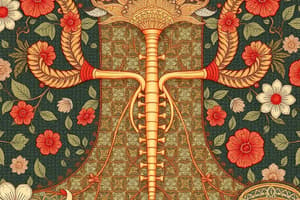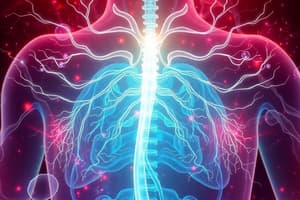Podcast
Questions and Answers
Which gland is often referred to as the "master gland" of the endocrine system?
Which gland is often referred to as the "master gland" of the endocrine system?
- Thyroid gland
- Adrenal gland
- Pineal gland
- Pituitary gland (correct)
The pancreas is responsible for producing hormones that regulate blood pressure.
The pancreas is responsible for producing hormones that regulate blood pressure.
False (B)
What is the primary role of hormones in the body?
What is the primary role of hormones in the body?
chemical messengers that regulate various bodily functions
The adrenal glands produce hormones that regulate the body's ______ response.
The adrenal glands produce hormones that regulate the body's ______ response.
Match the following glands with their primary function:
Match the following glands with their primary function:
Which of these is NOT considered a function of the endocrine system?
Which of these is NOT considered a function of the endocrine system?
The hypothalamus regulates sleep-wake cycles.
The hypothalamus regulates sleep-wake cycles.
Name two hormones produced by the pancreas.
Name two hormones produced by the pancreas.
The pineal gland produces hormones that regulate ______-wake cycles.
The pineal gland produces hormones that regulate ______-wake cycles.
Which endocrine gland is located in the neck?
Which endocrine gland is located in the neck?
Which hormone is responsible for regulating blood sugar levels by facilitating glucose uptake in cells?
Which hormone is responsible for regulating blood sugar levels by facilitating glucose uptake in cells?
Hypothyroidism is characterized by increased thyroid hormone production.
Hypothyroidism is characterized by increased thyroid hormone production.
What is the primary function of adrenaline?
What is the primary function of adrenaline?
The hormone that regulates growth and development, particularly during childhood and adolescence, is the ______
The hormone that regulates growth and development, particularly during childhood and adolescence, is the ______
Match the following hormones with their primary function:
Match the following hormones with their primary function:
Which of the following is a disorder characterized by excess cortisol production?
Which of the following is a disorder characterized by excess cortisol production?
Glucagon decreases blood sugar levels by facilitating glucose uptake in cells.
Glucagon decreases blood sugar levels by facilitating glucose uptake in cells.
What are two main hormones that regulate reproductive processes?
What are two main hormones that regulate reproductive processes?
A disorder characterized by high blood sugar levels due to impaired insulin production or function is known as ______.
A disorder characterized by high blood sugar levels due to impaired insulin production or function is known as ______.
Which of the following is NOT a key function of thyroid hormones?
Which of the following is NOT a key function of thyroid hormones?
Flashcards
What is the Endocrine System?
What is the Endocrine System?
The endocrine system is a network of glands that produce and regulate hormones, chemical messengers that control various bodily functions like growth, metabolism, and reproduction.
What is the Pituitary Gland?
What is the Pituitary Gland?
The pituitary gland, located at the base of the brain, is often called the "master gland" because it controls the activity of other endocrine glands.
What is the Thyroid Gland?
What is the Thyroid Gland?
The thyroid gland, situated in the neck, produces hormones that regulate metabolism, growth, and development.
What are the Adrenal Glands?
What are the Adrenal Glands?
Signup and view all the flashcards
What is the Pancreas?
What is the Pancreas?
Signup and view all the flashcards
What are the Ovaries?
What are the Ovaries?
Signup and view all the flashcards
What are the Testes?
What are the Testes?
Signup and view all the flashcards
What is the Hypothalamus?
What is the Hypothalamus?
Signup and view all the flashcards
What is the Pineal Gland?
What is the Pineal Gland?
Signup and view all the flashcards
What is the Endocrine System's role in Metabolism?
What is the Endocrine System's role in Metabolism?
Signup and view all the flashcards
Insulin
Insulin
Signup and view all the flashcards
Glucagon
Glucagon
Signup and view all the flashcards
Thyroid Hormones (T3 and T4)
Thyroid Hormones (T3 and T4)
Signup and view all the flashcards
Adrenaline (Epinephrine)
Adrenaline (Epinephrine)
Signup and view all the flashcards
Cortisol
Cortisol
Signup and view all the flashcards
Estrogen and Progesterone
Estrogen and Progesterone
Signup and view all the flashcards
Testosterone
Testosterone
Signup and view all the flashcards
Growth Hormone
Growth Hormone
Signup and view all the flashcards
Diabetes Mellitus
Diabetes Mellitus
Signup and view all the flashcards
Hypothyroidism
Hypothyroidism
Signup and view all the flashcards
Study Notes
Endocrine System Overview
- The endocrine system is a network of glands and organs that produce hormones, chemical messengers regulating bodily functions like growth, development, and metabolism.
Components of the Endocrine System
- Pituitary Gland: "Master gland," regulates other endocrine glands.
- Thyroid Gland: Located in the neck, controls metabolism, growth, and development.
- Adrenal Glands: Located on the kidneys; regulate stress response, blood pressure, and electrolytes.
- Pancreas: Behind the stomach; produces insulin and glucagon for blood sugar regulation.
- Ovaries (female): In the pelvis; produce estrogen and progesterone for reproduction.
- Testes (male): In the scrotum; produce testosterone for reproduction.
- Hypothalamus: In the brain; controls body temperature, hunger, and thirst; produces hormones affecting other endocrine glands.
- Pineal Gland: In the brain; produces hormones regulating sleep-wake cycles.
Functions of the Endocrine System
- Metabolism Regulation: Controls glucose and lipid metabolism.
- Growth and Development: Regulates growth, especially during childhood and adolescence.
- Reproductive Processes: Controls puberty, menstruation, and fertility.
- Electrolyte Balance: Maintains sodium, potassium, and calcium levels.
- Stress Response: Mediated by hormones like cortisol and adrenaline.
- Blood Pressure Regulation: Controlled by hormones like aldosterone and vasopressin.
Hormones and Their Functions
- Insulin: Facilitates glucose uptake into cells, regulating blood sugar.
- Glucagon: Stimulates glucose release from stored glycogen, regulating blood sugar.
- Thyroid Hormones (T3 and T4): Control metabolism, growth, and development.
- Adrenaline (Epinephrine): Increases heart rate and blood pressure during stress.
- Cortisol: Suppresses inflammation, regulates blood sugar, and responds to stress.
- Estrogen and Progesterone: Regulate female reproductive processes.
- Testosterone: Regulates male reproductive processes.
- Growth Hormone: Regulates growth and development.
Disorders of the Endocrine System
- Diabetes Mellitus: High blood sugar due to impaired insulin.
- Hypothyroidism: Decreased thyroid hormone production; fatigue, weight gain, dry skin.
- Hyperthyroidism: Increased thyroid hormone production; weight loss, anxiety, tremors.
- Cushing's Syndrome: Excess cortisol; weight gain, high blood pressure, mood changes.
- Polycystic Ovary Syndrome (PCOS): Hormonal imbalance; irregular periods, acne, infertility.
Studying That Suits You
Use AI to generate personalized quizzes and flashcards to suit your learning preferences.




